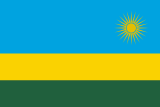This article needs additional citations for verification. (August 2012) |
 | |
| Ministry of Education | |
|---|---|
| Ministers and Ministers of State | |
| National education budget (2020/2021) | |
| Budget | 492 billion RWF[3] |
| General details | |
| Primary languages | English, French |
| System type | National |
| Literacy (2022) | |
| Total | 79%[6] |
| Male | 81%[5] |
| Female | 77%[4] |
| ‡ Includes Elementary, secondary and post-secondary non-tertiary education. | |
Education in Rwanda has undergone considerable changes throughout Rwanda's recent history, and has faced major disruptions due to periods of conflict. Education was divided by gender whereby women and men had a different education relevant to their responsibilities in day-to-day life. Women were mostly taught housekeeping while men were mainly taught how to hunt, raise animals, and fish. This is because Rwanda was a community-based society where every member had a specific contribution to the overall development of the community. Older family members like grandparents usually took on the role of educators.[7]
Despite improvements to education and literacy as part of the country's rebuilding after the 1994 genocide, the education system still faces challenges including low school enrolment rates and limited resources. The education system is overseen by the Ministry of Education.


The Human Rights Measurement Initiative (HRMI)[8] finds that Rwanda is fulfilling only 73.1 percent of what it should be fulfilling for the right to education based on the country's level of income.[9] HRMI breaks down the right to education by looking at the rights to both primary education and secondary education. While taking into consideration Rwanda's income level, the nation is achieving 94.7 percent of what should be possible based on its resources (income) for primary education but only 51.6% for secondary education.[9]
- ^ a b c Ivan R. Mugisha (February 27, 2020). "Kagame names new ministers in major reshuffle". The EastAfrican. Nairobi. Retrieved December 6, 2020.
- ^ a b "Republic of Rwanda - Government - The Cabinet".
- ^ "Education Sector Budget Up By 63%". June 23, 2020. Retrieved December 6, 2020.
- ^ "Literacy rate, adult female (% of females ages 15 and above) - Rwanda". The World Bank. Retrieved December 6, 2020.
- ^ "Literacy rate, adult male (% of males ages 15 and above) - Rwanda". The World Bank. Retrieved December 6, 2020.
- ^ "Literacy rate, adult total (% of people ages 15 and above) - Rwanda". The World Bank. Retrieved December 6, 2020.
- ^ "The lost value of informal education". The New Times −Rwanda. November 19, 2008. Retrieved April 25, 2022.
- ^ "Human Rights Measurement Initiative – The first global initiative to track the human rights performance of countries". humanrightsmeasurement.org. Retrieved March 26, 2022.
- ^ a b "Rwanda - HRMI Rights Tracker". rightstracker.org. Retrieved March 26, 2022.
© MMXXIII Rich X Search. We shall prevail. All rights reserved. Rich X Search
